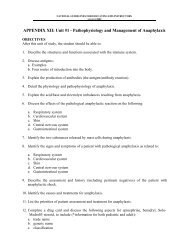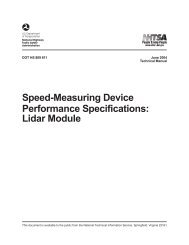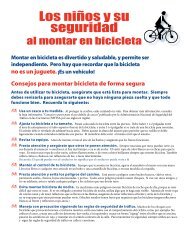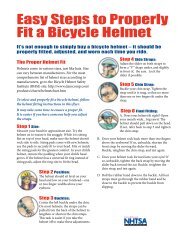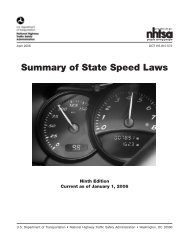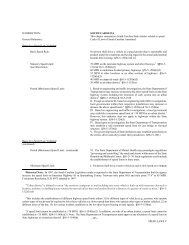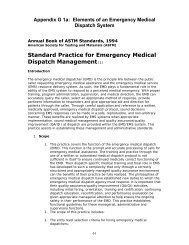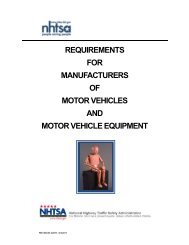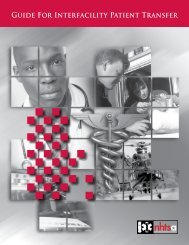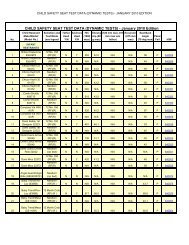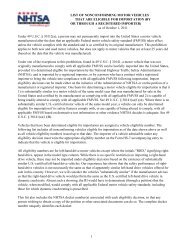The Criminal Justice System: A Guide for Law Enforcement ... - NHTSA
The Criminal Justice System: A Guide for Law Enforcement ... - NHTSA
The Criminal Justice System: A Guide for Law Enforcement ... - NHTSA
You also want an ePaper? Increase the reach of your titles
YUMPU automatically turns print PDFs into web optimized ePapers that Google loves.
classes taken as a law en<strong>for</strong>cement officer, and other special awards or permits<br />
you have. If a certification card was issued to you, bring that as well.<br />
3. READ YOUR INCIDENT REPORT be<strong>for</strong>e you go to court. Go over the details<br />
in your mind so that you will have an independent recollection of the events of the<br />
arrest. DO NOT go to court and ask the prosecutor <strong>for</strong> a copy of your report.<br />
However, do ask, prior to court, if you cannot locate a copy of your report.<br />
4. Dress neatly and professionally; leave sunglasses, flashlight, and other<br />
cumbersome equipment in your car be<strong>for</strong>e going into the courtroom, unless<br />
needed <strong>for</strong> a demonstration. Wear a coat and tie if you prefer and your agency<br />
allows it.<br />
5. Do not guess the answer to any question. It is OKAY to say “I don’t know” or “I<br />
can’t remember” in response to questions. Do not give the impression that you are<br />
guessing the answer by prefacing your response with “I think” or “I believe.” If<br />
you do not know the answer, it is okay to look at your report and refresh your<br />
memory. Always give definitive, positive, sure answers.<br />
6. Listen carefully to the question asked. Do not begin your answer until the<br />
prosecutor (or defense attorney) has finished asking the question. Be sure you<br />
understand the question be<strong>for</strong>e you attempt to give an answer. If necessary, ask<br />
that the question be repeated or rephrased if you do not understand it.<br />
7. Take your time. Do not feel pressured to give a quick answer. After a question is<br />
asked, there may be an objection; allow this to happen. When you hear the word<br />
“objection,” stop testifying until told you can continue.<br />
8. Answer the question that is asked, and then stop. DO NOT volunteer in<strong>for</strong>mation<br />
not asked <strong>for</strong>, or you will risk causing a mistrial (the judge ending the trial be<strong>for</strong>e<br />
it has reached a verdict) or even an immediate acquittal. DO explain an answer, if<br />
you feel your answer might appear ambiguous to the jury. You are always<br />
permitted to explain your answer. Prior to your testimony, tell the prosecutor<br />
anything you feel he might not – but needs to – know.<br />
9. Be serious in the courthouse. Jurors are aware that criminal prosecutions are<br />
serious business.<br />
10. Speak clearly and loudly so that you can be easily heard.<br />
11. At least occasionally, make eye contact with the jury when testifying (unless<br />
directed not to, as is the preference of some judges), even when the attorney<br />
asking the question is not standing near the box.<br />
12. Always be courteous, even when the defense attorney is not. Control your<br />
temper, and never allow yourself to be drawn into an argument. Remember, the<br />
12



